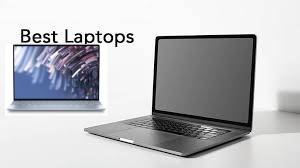Founders Of Laptop
The concept of a laptop computer evolved over time through the contributions of several key innovators and companies. Here is the list of founders of laptop, best laptop and their contributions:
-
Adam Osborne
- Year of Formation: 1981
- Country: United States
- Details: Adam Osborne is often credited with creating the first commercially successful portable computer, the Osborne 1. Released in 1981, it weighed 24.5 pounds and was considered highly portable for its time. The Osborne 1 featured a small built-in monitor. It aimed at business users who needed computing power on the go.
-
Bill Moggridge
- Year of Formation: 1982
- Country: United Kingdom / United States
- Details: Bill Moggridge co-founded IDEO, a global design and consulting firm known for its innovative designs. It includes computer hardware. While not a direct founder of a laptop brand. Moggridge’s influence on the design and usability principles of early portable computers, including laptops, has been profound.
-
John Ellenby
- Year of Formation: 1982
- Country: United Kingdom / United States
- Details: John Ellenby is known for founding Grid Systems Corporation in 1979, which produced the GRiD Compass computer in 1982. The GRiD Compass is often considered one of the first true laptop computers. It features a clamshell design with a flat LCD screen and a folding keyboard. It was rugged, had long battery life, and was used by NASA on the Space Shuttle program.
-
Alan Kay and Adele Goldberg (Xerox PARC)
- Year of Formation: Xerox PARC was established in 1970.
- Country: United States
- Details: While not directly founders of a laptop brand, Alan Kay and Adele Goldberg at Xerox PARC made significant contributions.They developed the Dynabook concept in the early 1970s, envisioning a portable computer that could be used by individuals for both work and personal tasks. Although the Dynabook was not realized as a commercial product at the time Their ideas influenced future developments in mobile computing, including laptops.
-
IBM
- Year of Formation: IBM was founded in 1911.
- Country: United States
- Details: IBM’s contribution to the laptop’s evolution came with the introduction of the IBM ThinkPad series in 1992. The ThinkPad, designed by Richard Sapper and engineered by a team led by Arimasa Naitoh, quickly became synonymous with business laptops due to its robust build quality, innovative features like the TrackPoint pointing device, and high-quality keyboards. The ThinkPad series set a benchmark for reliability and performance in the laptop market.
-
Michael Dell (Dell Inc.)
- Year of Formation: Dell Inc. was founded in 1984.
- Country: United States
- Details: Michael Dell founded Dell Inc. with the vision of providing customized, affordable personal computers directly to consumers. While Dell is known more for its desktop computers and later for its broad range of laptops, the company played a significant role in popularizing the direct sales model for laptops, allowing customers to configure their machines online and receive them quickly.
-
Steve Jobs and Steve Wozniak (Apple Inc.)
- Year of Formation: Apple Inc. was founded in 1976.
- Country: United States
- Details: While Apple’s early contributions were primarily in desktop computing, the company’s focus on innovation and design excellence extended to laptops with the introduction of the PowerBook series in 1991. Designed by Jony Ive, the PowerBook introduced features such as a trackball (later replaced by a trackpad), a compact design, and an ergonomic keyboard layout. The PowerBook series set new standards for portable computing aesthetics and functionality.
-
Larry Page and Sergey Brin (Google)
- Year of Formation: Google was founded in 1998.
- Country: United States
- Details: While not traditionally associated with hardware manufacturing, Google’s development of the Chrome OS operating system in the 2000s significantly impacted the laptop market. Chromebooks, which run on Chrome OS, represent a new breed of laptops known for their lightweight, affordable, and cloud-centric approach. Google’s push with Chromebooks has made computing more accessible, especially in education and for users who primarily use web-based applications.
-
Jef Raskin (Canon Cat)
- Year of Formation: 1987 (development started earlier)
- Country: United States
- Details: Jef Raskin, known for his work on the Macintosh project at Apple, later collaborated with Canon to develop the Canon Cat in the mid-1980s. Although not a traditional laptop, the Canon Cat was a compact, dedicated word processor with an innovative user interface designed for simplicity and efficiency. Its design principles influenced later portable computing devices by emphasizing ease of use and productivity.
-
Michael S. Braun (Compaq Computer Corporation)
- Year of Formation: 1982
- Country: United States
- Details: Michael S. Braun co-founded Compaq, which became one of the largest manufacturers of personal computers in the 1980s and 1990s. Compaq’s Portable series, introduced in 1983, was among the earliest IBM-compatible portable computers. While not as compact or lightweight as later laptops, these portables contributed to the trend of mobile computing by providing users with a more flexible computing solution.
-
Meg Whitman (Hewlett-Packard)
- Year of Formation: Hewlett-Packard (HP) was founded in 1939.
- Country: United States
- Details: Meg Whitman served as CEO of HP from 2011 to 2015 while overseeing the company during a pivotal period in its laptop product development. HP’s Pavilion and Envy series have been recognized for their sleek designs, high performance, and innovative features. Under Whitman’s leadership, HP continued to innovate in the laptop market, introducing convertible devices and focusing on design aesthetics and user experience.
These additional figures and companies have contributed in various ways to the evolution of laptops, from early portable computers to modern, sleek devices that blend performance with portability and style. Each founder or leader brought unique insights and innovations that have collectively shaped the laptop industry into what it is today—a diverse and essential category of personal computing devices.

